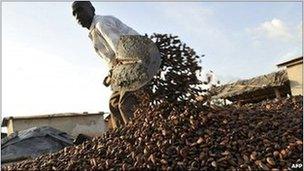Ivory Coast crisis: Gbagbo orders state cocoa control
- Published

Ivory Coast is the world's biggest cocoa producer
Ivory Coast's disputed President Laurent Gbagbo has ordered the government to take control of all cocoa purchases and exports.
A decree read out on state TV said the purchase from producers "will be undertaken exclusively by the state"
Alassane Ouattara, internationally recognised as president, has called for a temporary ban on exports to try to force Mr Gbagbo from power.
Ivory Coast is the world's biggest cocoa producer.
The country's industry accounts for 40% of global supplies and is currently dominated by multinational companies.
The price of cocoa has been trading at its highest levels for a year, as supplies have been strangled by recent sanctions and the near collapse of the banking system.
The UN-backed electoral commission says Mr Ouattara won presidential elections in November, but the Constitutional Council overruled it, citing rigging in the north.
Heavy shooting
Meanwhile, Mr Gbagbo has declined an invitation to attend an African Union meeting in Ethiopia on Thursday.
He had been invited along with Mr Ouattara to hear the AU's intended resolution to the crisis; instead he is sending the head of his party and his foreign minister - two known hardliners.
The BBC's John James in the main city of Abidjan says if the AU mission fails, it is likely to increase the chances of a return to civil war.
He says things remain calm along most of the former ceasefire line between the pro-Ouattara New Force former rebels in the north and the pro-Gbagbo army in the south.
But in the far west where the former rebels have been taking territory, movement seems aimed at securing areas around the town of Toulepleu, which was captured on Sunday.
Publicly the New Forces says their objective is to cut off access to Liberian mercenaries rather than to move on to bigger towns in the south and east.
In Abidjan, there was heavy shooting on Tuesday in the Treichville neighbourhood after a march to commemorate six women killed during a demonstration last week by security forces.
At least three people seen as Gbagbo supporters were killed in the pro-Ouattara district of Abobo on Monday, and houses set alight.
"Among the victims were people with their throats cut," one inhabitant said.
Incredulity
Our reporter says cocoa goes right to the heart of the conflict between Mr Gbagbo and his rival Mr Ouattara.
The decree to effectively nationalise the cocoa sector is an attempt by Mr Gbagbo to get some money after Mr Ouattara's boycott call.
The move has also been met with surprise and incredulity in the trade as it is a radical shake-up, our reporter says.
The state will set a price to buy beans from farmers, rather than the situation at the moment where it fluctuates hour by hour.
At the same time, the state will be in charge of either exporting the cocoa beans themselves or giving licences for others to exports.
But given the financial crisis since the election, it is very difficult to see how the government will be able to implement the reforms, our correspondent says.
It is difficult to do basic things without banks; even paying salaries is now problematic, he says.
It is not known whether Mr Gbagbo's government has the money to pay the farmers immediately or the warehouses to store the cocoa beans.
The European Union, US and West African states have adopted various financial sanctions against Mr Gbagbo and his closest allies after the incumbent leader failed to step down after the polls.
Exporters have stopped registering new beans for export as a result of the sanctions, as well as due to a ban called for by Mr Ouattara and extended last month until 15 March.
According to industry regulatory data cited by Reuters news agency, almost 500,000 tonnes of cocoa beans, more than a third of the country's annual output, is sitting at Ivorian ports.
Cluff Gold Plc, a British mining firm, said on Monday it had suspended operations at its Angovia mine due to shortages of fuel and other materials, and would not reopen it until stability returns.
The United Nations says at least 365 have been killed in the crisis since November's vote, although some believe the figure could be much higher.
Around 300,000 Ivorians have fled their homes to shelter elsewhere in the country, while 72,000 have taken refugee across the border in Liberia, the UN refugee agency estimates.
Aid agency Oxfam says people fleeing the violence are in need of clean water, food and shelter and warned the crisis risks becoming another "forgotten emergency".
The long-delayed elections had been supposed to reunify the country - once the richest in West Africa - which has been divided since a 2002 civil war.